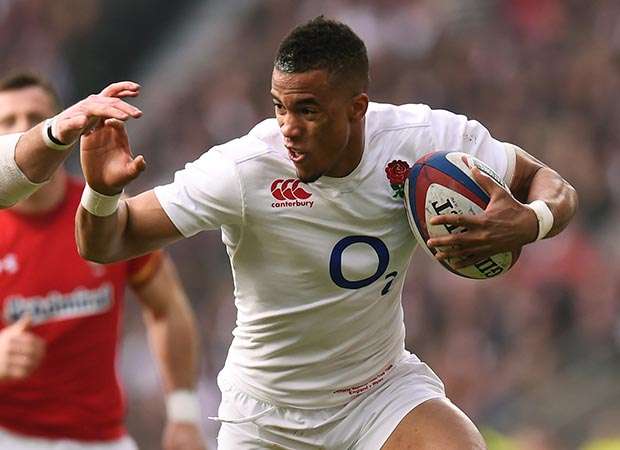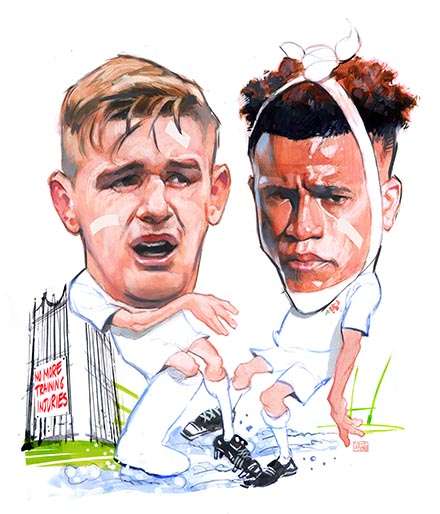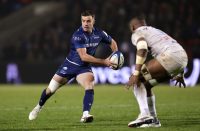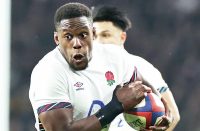 Training injuries happen, and as long as Rugby Union remains a contact sport they always will. The fact that England, after a virtually injury-free Six Nations and Australia tour under Eddie Jones, were unfortunate enough to incur two during their two-day training block in Brighton earlier this week is just the luck of the draw.
Training injuries happen, and as long as Rugby Union remains a contact sport they always will. The fact that England, after a virtually injury-free Six Nations and Australia tour under Eddie Jones, were unfortunate enough to incur two during their two-day training block in Brighton earlier this week is just the luck of the draw.
The timing is very unfortunate for Wasps rising flanker Sam Jones, who sustained a broken fibula, and for Bath wing Anthony Watson, who suffered a broken cheekbone, as well as for their clubs.
However, it is living in la-la land to think that you can wrap professional players in cotton wool and eradicate training injuries, as every club coach and player knows. It is also true that there is never a good time to have an injury as a player, although the one-month close season in the summer is often put forward in the professional game as the most “advantageous” medical window.
This adds to the sense that the furore surrounding the injuries to Jones and Watson has been totally overblown. What is also clear is that this is mainly about a disagreement between individual Premiership clubs and their administrative arm, Premiership Rugby, about the changes to the England training windows that the latter agreed with the RFU.
Under the terms of the new £220m club-country eight year deal signed off this summer by Premiership Rugby chief executive Mark McCafferty and his RFU counterpart, Ian Ritchie, England were allowed to hold three two-day camps during the Premiership campaign. In return, the Premiership clubs are being well remunerated by the RFU for the release of their players.
Yet, as Saracens rugby director Mark McCall made clear on Thursday, he is unhappy with the schedule and the way it impacts on clubs, and also that those at the sharp end were not consulted about the changes.
McCall said: “From our club’s point of view we thought that Premiership Rugby could have fought harder as to where these camps are situated in the calendar…for us to have it ten days before our first European Champions Cup game was flabbergasting.” He added that the PRL had “to be careful chasing all this money at the expense of the clubs”.
McCall fighting his corner is understandable, especially given that Saracens have nine players in the 45 man England EPS, the biggest single Premiership club contingent.
Nevertheless, the inescapable conclusion is that Premiership Rugby and the clubs they represent failed to get their act together on the negotiating front this summer. For McCall to say that rugby directors like himself were not consulted on something as fundamental as the England training schedule shows just how poor the PRL’s internal lines of communication are.
 What was unacceptable was the way that Premiership Rugby then tried to abnegate responsibility for the schedule by blaming the England coaches for the intensity of the training. They released a statement which read: “This format was not anticipated and we would not expect full training sessions to occur during the other two-day England camps planned this season.”
What was unacceptable was the way that Premiership Rugby then tried to abnegate responsibility for the schedule by blaming the England coaches for the intensity of the training. They released a statement which read: “This format was not anticipated and we would not expect full training sessions to occur during the other two-day England camps planned this season.”
This was immediately contradicted by the RFU who put out a statement saying that the club- country agreement had been negotiated, “over a long period in great detail”.
It said that every Premiership club had signed the agreement, adding: “The dates of the training camps for the next three years are clearly listed in the agreement, and there is no suggestion that the training camps would not include game training.”
The inclusion of judo sessions also came under close scrutiny, with strong suggestions that it was inappropriate immediately after a weekend of Premiership games.
An alternative perspective was given to me by Billy Vunipola. The Saracens No.8 said it was an important component in England being able to overcome their Southern Hemisphere opponents in the autumn internationals.
“I thought it was good. It gives us a different perspective on how you manipulate another player’s body. Eddie Jones wants us to be smart as well as physical, and if you can get that edge when they are carrying into you and still be dominating while saving energy, then you can use it for other things.”
He continued: “The biggest thing I took from it was the close quarter stuff, and that if your hips are close to your opponent the shoulder follows. With tackling, if you’re lunging and it’s more arms and shoulder then you’re probably going to miss it, because your hips are where the power if comes from.”
Asked if it was an important addition to training, Vunipola responded: “Definitely. Eddie looks at other sports to see where we can get an edge. With judo he thought we could improve in that area, and we talked about the tackles we’d missed (against Australia) – and I’m one of those who doesn’t get my hips in close enough to tackle. So, if I don’t hit them, I miss them. There’s no middle ground.”
Vunipola also explained the tactical landscape against Southern Hemisphere opponents:
“A lot of the tries in the Rugby Championship come from their own middle third. They play what they see. That’s where we have to be consistently alert, and give them the impression they can’t go. You’ve just got to give them the white wall.”
And if the England coach deems that white wall can be improved with some judo know-how, Premiership Rugby should let him get on with it.























